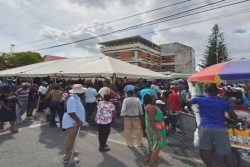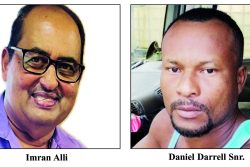Some 38 young people graduated recently as the first batch of Biomedical Technicians and are now equipped with a City and Guilds certificate, which enables them to provide much-needed support within the public health sector, according to a release from the Depart-ment of Public Information (DPI).
Last year when the ministry started the programme, it described it as a landmark initiative. DPI said that the diverse group of young people had already been dispatched to various hospitals across the country, wielding the innovative mindset and technical know-how to propel Guyana towards a more technologically advanced future.
According to the release, Esha Jaikaran, one of the graduates, shared that the programme was challenging yet rewarding. She highlighted the invaluable support she received from family and friends.
“It was a wonderful experience, and being here is very emotional for me, because I did not expect myself to pass, I had a lot of doubts. I am glad I stayed on and kept in contact with them, because it is a very interesting and amazing programme. It was a little challenging, but eventually you understand and you apply whatever you learned, so it has been good,” the DPI quoted her as saying.
Another graduate, Kumar Persaud, who is stationed at the West Deme-rara Regional Hospital in Region Three (Essequibo Islands-West Demerara), told the DPI that the experiences of this inaugural class has the potential to inspire and guide those who will follow.
“Being the first batch of biomedical students… This is a great initiative because we are setting the pace for the next generation to come. Doing the programme and having the practical done at the same time, and being employed is an asset,” he was quoted as saying.
The DPI also spoke to Dervin Bennet who said he recognised the value of the initiative, within the context of the steadily emerging biomedical field in Guyana.
“With the implementation of this programme, we can now safely say we have biomedical technicians on hand. In addition to that, we have biomedical technicians who are equipped with the skills needed for modern equipment, which is important”, Bennet was quoted as saying. “What this training does, and how it was structured, allows us to be biomedical technicians in an evolving field. As we know, technology is always evolving. We also have a network of support that we can always rely on.”
During the programme, the technicians were exposed to hands-on calibration instruction, which allowed them to troubleshoot issues. According to Bennet, this element has opened doors for innovation by enabling the repair of complex equipment.
Another graduate, 29-year-old Teanna Bagot said that the initiative helped to strengthen her knowledge and skills in the area of expertise.
Bagot said she has used the training as an opportunity to provide a better quality of work in her field.
“It was very refreshing. It would have refreshed my memory on things I have already learned, so that I’ll be able to apply myself as a young technician in the biomedical field which would help to bring a more reliable and efficient service to the hospital,” she told DPI.
According to the release, the biomedical programme is a collaboration between the government and Medical Aid International and is aimed at equipping individuals from across the country with the skills to repair and maintain medical equipment. Once they have completed the training, they are placed as full-time employees at facilities in their region.
The release further noted that bioengineering is a rapidly developing discipline that combines principles of engineering with biology to create modern solutions. The government’s decision to implement this initiative reflects a forward-thinking ap-proach to harnessing scientific advancements for national development, it added.






